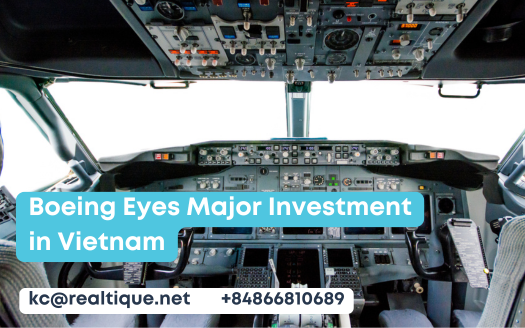Boeing Eyes Major Investment in Vietnam
Table of Contents
Boeing’s potential investment in Vietnam marks a significant turning point in the nation’s aviation environment, as the company plans to establish manufacturing and maintenance facilities. This initiative aligns with Vietnam’s socio-economic goals and highlights the growing importance of local production capabilities. In addition, the collaboration between Boeing and local firms promises not only to create thousands of jobs but also to enhance Vietnam’s role in the global aviation market. As this investment unfolds, the implications for both Boeing and Vietnam’s economic path warrant closer examination. What challenges and opportunities lie ahead in this strategic partnership?
Boeing's Investment Proposal in Vietnam
Boeing’s recent investment proposal in Vietnam signifies a strategic move to enhance the country’s aviation capabilities. The proposal, presented by Vietnam’s President and General Secretary during discussions with Boeing’s Senior Vice President, Brendan Nelson, focuses on establishing component manufacturing facilities and maintenance centers within Vietnam.
This initiative aims to strengthen local production capabilities, creating a sturdy structure for the aviation sector. Vietnam has expressed its commitment to nurturing an environment conducive to U.S. companies, including Boeing, emphasizing efficient business operations.
Vietnam Aviation Infrastructure Development
Significant advancements in aviation infrastructure are underway in Vietnam, highlighting the nation’s commitment to enhancing its air transport capabilities. A key initiative is the Long Thanh airport project, which spans 5,000 hectares and aims to accommodate a substantial increase in air traffic.
With an estimated investment of approximately $16.06 billion, this airport is set to become a crucial hub in Southeast Asia. Additionally, the ongoing expansion of Tân Sơn Nhất airport, featuring a new terminal (T3), is set to raise its capacity to around 11,000 passengers.
These developments not only reflect Vietnam’s strategic vision for a modernized aviation sector but also create a conducive environment for international partnerships, including potential collaborations with Boeing to further strengthen the region’s aviation environment.
Boeing's Collaboration and Support
A strong structure for collaboration is essential to maximize the potential benefits of Boeing’s investment in Vietnam.
Boeing is committed to strengthening partnerships with local firms, focusing on training human resources and facilitating technology transfer initiatives. This collaboration encourages Vietnamese companies to engage more deeply in Boeing’s supply chain, enhancing their capabilities and competitiveness.
Additionally, support for research and development collaborations is crucial in promoting innovation within Vietnam’s aviation sector. By leveraging Vietnam’s growing role in the global aviation ecosystem, Boeing aims to create a sturdy network that benefits both parties.
This collaborative approach not only aims to raise local industry standards but also positions Vietnam as a key player in the global aviation market.
The anticipated economic impact of Boeing’s investment in Vietnam is set to be substantial, offering numerous opportunities for growth within the aviation sector.
The establishment of Boeing’s manufacturing facilities is expected to create thousands of new jobs, increasing local employment rates and enhancing the skills of the workforce.
Additionally, the collaboration between Boeing and Vietnam Airlines will facilitate financial support and innovative solutions, further reinforcing the aviation infrastructure.
This investment aligns with Vietnam’s strategic vision for socio-economic development, as a strong aviation sector is essential for attracting tourism and foreign investment.
Consequently, the expansion of the aviation industry will not only enhance domestic capabilities but also position Vietnam as a key player in the global aviation market.
Boeing's Global Presence
With a strong presence across 65 countries, Boeing stands as the largest aerospace company in the world, specializing in the design and production of commercial aircraft. The company employs over 140,000 staff globally and reported revenues exceeding $94.5 billion in 2020.
Boeing’s extensive network not only highlights its leadership in aviation but also its commitment to encouraging growth in emerging markets. The company prioritizes sustainability and innovation, investing in advanced technologies that enhance efficiency and reduce environmental impact.





